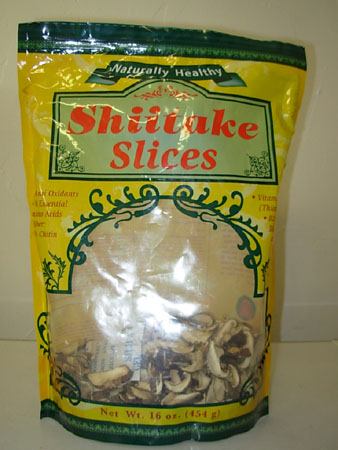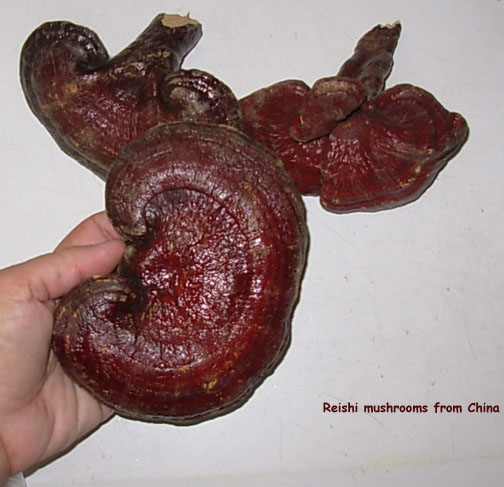Saturday, December 29th, 2007
The vet who diagnosed Ginger said 500 mg of mushroom supplements twice daily when I asked what I could give her, so I went onto the canine cancer group on yahoo and found a file on mushrooms and this is what it said:
Many of us have added mushrooms of various kinds to our dogs’ diets to help them fight this battle. Asian cultures have used them for thousands of years, and in modern times medical scientists in China and Japan have analyzed them and reported their findings in recognized “western” medical journals. Western conventional medicine has also done extensive studies and the literature recognizes the value of mushrooms, and credits four mushrooms with strong anti-cancer properties – Coriolus Versicolor (Turkey tail), Shitake, Maitake, and Reiki. The Memorial Sloan Kettering and MD Anderson Cancer Centers databases identify the substance in which these mushroonms are rich that give them their anti-cancer properties: A range of protein-bound polysaccarides and polysaccharide peptides, of which PSK, PSP and TAC (short for long chemical names) are primary.
How They Work
“PSK”, a mushroom extract (primarily from Coriolus versicolor, a.k.a. Trametes versicolor) has been used for 1,000’s of years in East Asian medicine/herbalism. The polysaccharides in PSK work by “docking” on to receptor sites on the surface of the immune cells. If an immune cell finds a “problem”, something that is not you (virus, bacteria, malignant cell etc…), it sends out a message to the rest of the cellular immune system to mobilize and respond. All of the immune cells have receptors to receive this information. The polysaccharides in medicinal mushrooms are docking on to these receptor sites, as in a “lock and key” receptor relationship (polysaccharides/beta glucans are the key), and initiating the immune response. The polysaccharides mimic the “threat” message that one immune cell sends out to the rest of the immune system and it triggers the immune response. This has been proven to be effective in preventing the recurrence of cancer in many but not all people. The Memorial Sloan Kettering & MD Anderson databases have links to the many recognized studies that verify this claim.
The research is very arcane. The sense I have been able to make of it is that the PSK etc action is most effective directly on certain cancers (prostate and colon have been studied) and more effective in preventing metasticis (a word I can never spell) particularly when a large tumor has been debulked through surgery, chemo, or radiation. There appear to be minimal effects and no drug interaction concerns with mushrooms (though you must go to the databases and check for yourselves – I am not qualified to give medical info of any kind) so they might be a perfect adjunctive therapy to be maintained along with whatever your vet/oncologist is doing with conventional medicine.
How To Buy The Right Product
I went to Whole Foods and discovered a whole shelf full of products derived from mushrooms. Most were capsules, and several had a blend of the particular mushrooms I was looking for. Great! I though, and I bought a product made by Jarrow thinking I was getting what I needed.
Subesquently I learned that most U.S. companies, even famous ones, sell mushroom supplements… You can know that you have the supplement you need for our particular purpose by looking for guaranteed levels of polysaccharides, listed as a percentage (%), on the label in the “Supplement Facts” panel. If this information is not listed on the label of a mushroom supplement do not buy it.
The product I bought did not have any listing of polysaccharide levels. When I e-mailed Jarrow asking about those levels, I got this answer on 4/22 and have heard nothing since: Dear Cynthia Kelly: I don’t believe that we standardize for the polysaccharide content, either individually or collectivly, but I will inquire and get back to you. Regards, John O’Connor Technical Support Jarrow Formulas, Inc.
Most companies gather the mushrooms and the medium on which they’re grown (usually organic brown rice) dry it all out, powder it, and put it in the capsule. There are virtually no available polysaccharides in this technique. The way to get polysaccharides from mushrooms is through a hot water extract. There is one company, Mushrom Science, that uses this technique and includes guaranteed levels of polysacchrides on their labels. Their products are widely available, and their website has tons of info on, yes, mushroom science – (I have no connection of any kind with them.)
Buying a product that has been correctly processed and analyzed means you know what you’re getting, the amounts are standardized per capsule, and the capsules are easy to store and to open to sprinkle over food. Hot water extract also means we can do it at home. Buy shitake, reiki, maitake, and (impossible to find except in Asian markets) coriolus versicolor, whip them up with water in a blender, and bring the puree to a boil. You now have that hot water extract, full of protein-bound polysaccarides and polysaccharide peptides, which can be poured over their food and, hey, even over ours…
Good Asian markets and Chinese herbalists will also have many mushroom products from companies in China and Japan that have been producing them for hundreds of years, to very high standards. For the American market much of their literature is translated and vry informative in general.
Here are the links to the MSK and MD Anderson databases for more nfo and connection to the scientific studies:
Memorial Sloan-Kettering Cancer Center (use the lower search bar at mskcc, not the one at the top of the page)
Herbal / Plant Therapies: Coriolus versicolor
Cynthia Kelly – Honoring Prima, 9/22/99 – 6/27/05
—
I e-mailed Cynthia Kelly, but the e-mail bounced back. She provided excellent information. I had bought a bottle of mushrooms before reading this. I’d yet to open it, and when I looked for the polysaccharides on the label, there were none! So I returned it.
I used two types of mushrooms for Ginger. The shitake mushroom, which Costco sells on a regular basis:

And I ordered some Reishi mushrooms from an herbal company. I was astounded when those mushrooms arrived. They are huge and woody! They weren’t on the list above, but I found them listed on animal-hospitals website.

Ginger gets mushroom tea twice a day among other herbs, which I will blog in the future. My other kids love the shitake mushrooms so much, they beg for them when I’m grinding Ginger’s up for her potion. They are tasty! Try some.
